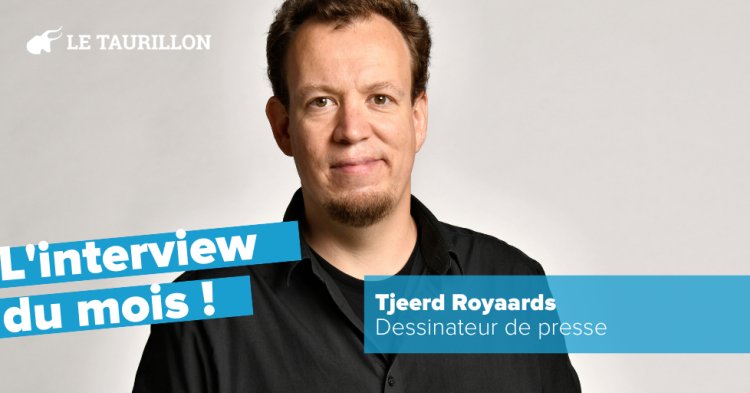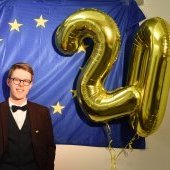First of all, about your work as a cartoonist. Why and when did you choose this work ? You never changed your mind ?
Like many cartoonists, I fell into it because I loved to draw. I was always drawing when I was young. When I was 18, I was confronted with a choice : would I go to an art school ? Finally, I decided to study political sciences. But I never lost my attraction for drawing and I finally decided later on to make it my profession, despite the difficulties.
We can think that Europe, the European Union is not a very catchy subject… Why are you making cartoons about European topics and news ? And what are more generally your inspirations ?
It is because I’ve always thought that Europe is important. All the things I’m drawing about can be studied at a European level. Climate change, refugees, all of that has of course implications for the European union. I am very interested in these issues and when I sit down and think about them, I realise that Dutch politics is not the only one to look at, I have to expand it to the whole world. Economy, society, politics… I have a degree in international relations. I have an attraction for news, like a journalist, I keep myself informed, it is part of my job.
How has your work evolved since you began as a cartoonist ? What do you think about the protection of cartoonists and of the freedom of speech in Europe and specifically in your country ? Is it easier or more difficult to do your work nowadays ?
I think I began approximately 17 years ago and it took me seven years to really get into the job with orders. Hopefully I can continue like that for a long time. However, I’m not very optimistic about the job of cartoonist. Look at the state of press freedom. You can think about Charlie Hebdo in France. And beyond the danger, it’s getting harder to make a living from it. The economic situation is not favourable, some media are abandoning press cartoons.
Your cartoons are published in different European media and newspapers. Do you see differences in the way they publish them ? For example, in France, certain subjects such as secularism are very particular. And the humour can be very different depending on the country. Do you pay attention to this when delivering your drawings or not ?
Actually, I’m still very lucky to be a Dutch cartoonist. When you look at the press freedom rankings, we are always in the top 10. But one of the things I would like to change is that for the moment, cartooning is not part of journalist organisations and we do not enjoy the protections afforded to journalists. About the differences between media, that’s a point, but I don’t change my drawings. I can predict what will work with what type of audience but, anyhow, it’s very difficult to change style. I learned to be happy with what I do.
About Cartoon Movement. Why did you decide to run this organisation ? How does it work today ?
I worked with a journalistic platform and one day, they told me about their will to do an international platform for journalists and they asked me if I was interested in doing the same for cartoonists. It was about twelve years ago. It has become a community of more than 600 cartoonists, spread all around the world. We are a publication platform and in the back-end, we make money by reselling drawings. We can also develop projects on specific topics like we did with the Council of Europe.
You are also a member of Cartoonists Rights Network International, and in Cartooning for peace… How are these organisations helping you and other professionals ?
In general, any organisation that promotes cartoons is a good thing. We work very close, especially with monitoring. But it’s more than that. We help cartoonists when they are in need. Recently, we helped H., a cartoonist from Kabul. H. worked with Cartoon movement on several international cartoon projects. He needed to leave the country, fearing for his life as the Taliban advanced towards Kabul. With help from the Dutch Ministry of Foreign Affairs (who has funded several of our projects, including the ones in which H. participated) we were able to get him on the evacuation list. With some more luck, H. was able to reach the airport after an arduous journey and several failed attempts and is currently safe in the Netherlands. We try to help cartoonists around the globe, but given the state of press freedom, there are parts of the world that have no political cartoonists at all. China is an example of this, although we do have some cartoonists in Taiwan and Hong Kong.
On another topic, when did you learn about your nomination for the European cartoon award ? What was your feeling about that ? How do you think that this kind of European award is a good means to help European people to discover the work of other cartoonists from all over the continent ?
I feel awesome, of course. I’m very honoured that my cartoons were nominated. All the initiatives that award prizes to cartoons are a good thing, especially at the European level because I think, and I hope, that this could develop the practice. When you look at the 16 cartoons nominated, they are all on important pan-European topics, and it’s a great thing that this award puts them in the spotlight. Look at something like the “World Press Photo”, which is organised every year and allows the images to be shown in a place, it tells a story. And cartoons, as photographs, tell stories. The cartoons nominated are gonna be in an exhibition, to gain visibility.
Can you explain us your cartoon “European Democracies” ? And what is your feeling about Belarus and the action of the EU about that situation ?
I tried to be optimistic on that point, but the EU could do so much more with Belarus. If we want the EU as an organisation based on values, democracy should be a crucial one. My cartoon was precisely about that.
And your other cartoon « Summertime in Europe » ?
I think that during the pandemic, at one point this summer, people seemed to forget coronavirus. During summer, after the lockdown, everybody was acting like we had moved on. But it was not the end of the pandemic.
One last question, how do you usually portray the EU ?
I usually refer to the EU in cartoons with the symbol of twelve yellow stars on a field of blue, because I feel that’s the most recognisable to most people. The mythological reference of Europa on the bull many people do not get, and drawing Europe as an old (or young) woman runs the risk of being seen as sexist. So when I need to personify the European Union, I usually draw a nondescript middle-aged balding man in a suit, as a symbol of grey European politicians no one knows or as a symbol of the Brussels bureaucracy.


Suivre les commentaires : |
|
